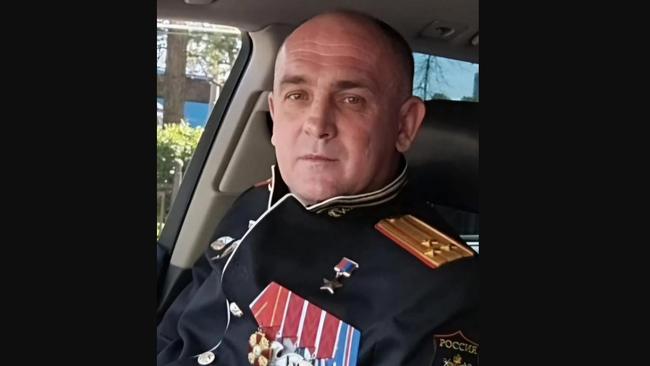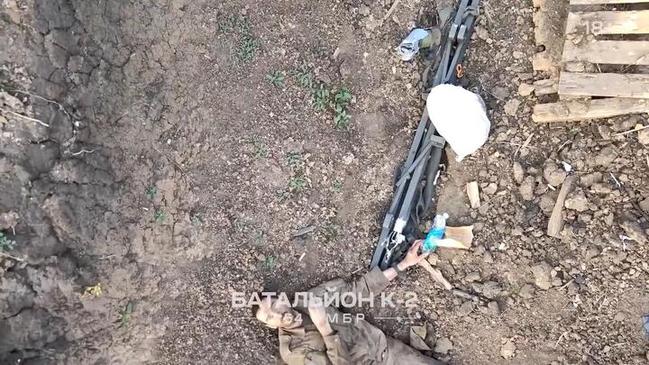Death of Russian major general who tortured his own troops
Russian soldier’s relative lashes out at dead general: ‘This is your punishment, scum … God heard our tears and prayers.’

OBITUARY
Pavel Klimenko, Russian major general
Born, Stavropol, USSR, June 29, 1977; died Donetsk, Ukraine, November 6, aged 47.
The death of Pavel Klimenko last week shines a light on some of the darkest corners of the Russian military mindset and its satanic wing operating in Ukraine. Perhaps this misanthrope was mentally unwell; his savagery was uncommon, even by Russian military standards.
In the few towns the Ukrainian troops have been able to retake they have discovered darkened, airless pits in which Ukrainian soldiers and citizens have been tortured. There were 10 such centres in the town of Izium alone. To take that town Russians soldiers shot harmless locals in their cars and bombed an apartment building, killing 44 innocents.
Little is known of Klimenko’s early life other than that he attended the Saint Petersburg Combined-Arms Command High School and that he was part of the Russian forces that illegally occupied Crimea from February 2014. His army bosses saw something in him and he was steadily promoted.
He first gained notoriety earlier this year when men under his command were revealed to have murdered a delusional American communist, Russell Bentley, who had gained Russian citizenship and volunteered to fight with forces loyal to Putin in Donetsk. Calling himself the Donbas Cowboy, he must have been an odd sight on the frontline. Two soldiers of Klimenko’s 5th Separate Motor Rifle Brigade apparently decided Bentley, a convicted drug trafficker, was an American spy, so kidnapped and blindfolded him before killing him on April 19.
Perhaps realising their error – a Russian passport was among his belongings – they placed his body in a car and blew it up to try to conceal their crime, then moved his remains elsewhere. Three of Klimenko’s soldiers have been charged over the murder. For Klimenko it was just another day at the office and he was promoted to major general the following month.
Only on his death, and with his victims’ relatives free to speak out, has his evil been fully revealed. It was reported that his brigade ran a torture centre for Russian troops who refused to fight and that disabled soldiers were sent back into battle. Others there were reportedly starved.

London’s The Telegraph newspaper reported comments of social media sites from relatives of soldiers who had died under Klimenko’s command. Anastasia wrote: “This is your punishment, scum, for all the men whose lives you played with like cards!!! God heard our tears and prayers.” Another, named Victoria, explained that her son had been kept in a basement “like cattle”. He had been injured. She said he had been forced back into battle, but not given a rifle or any body armour. “Burn in hell, animal!” she wrote.
Among Ukrainian units, Klimenko was well known for what they termed his daily “meat assaults” – teams of Russian soldiers arriving in regular waves on kamikaze-like missions, who are then mown down by the Ukrainians, who believe it is a tactic to locate machine gun emplacements.
In July, Lieutenant Colonel Anton Bayev, of the Khartia Brigade of Ukraine’s National Guard, told the BBC torrents of Russian troops can be sent to attack the Ukrainian frontline positions. “The Russians use these units in most cases purely to see where our firing equipment is located, and to constantly exhaust our units,” he said. Bayev’s brigade has drones forward of their positions and can see the enemy movements as they approach with impossible vulnerability. “Our guys stand in positions and fight, and when four or five waves of the enemy come at you in a day, which you have to destroy without end, it is very difficult – not only physically, but also psychologically.”
Presumably, it was one of Bayev’s drones that identified Klimenko among a group of riders on motorcycles conducting a reconnaissance of the battle front. The drone was crashed into him and, according to the official report, he died of “blunt head trauma” after being taken to hospital.
He was the eighth Russian general to be killed in the conflict and his tactics are partly blamed for the breathtaking loss of life. Last month was the deadliest for the Russians since the war began in February 2022.
Britain’s Defence Secretary, John Healey, announced last week that UK intelligence estimated 41,980 Russian troops had been killed or wounded in October, during which there were six of the bloodiest days of the war. Russia is losing 1354 troops every day but has about 1.5 million defence personnel and earlier this year was recruiting 30,000 more each month.
Kyiv puts Russian losses so far at 700,000.







To join the conversation, please log in. Don't have an account? Register
Join the conversation, you are commenting as Logout